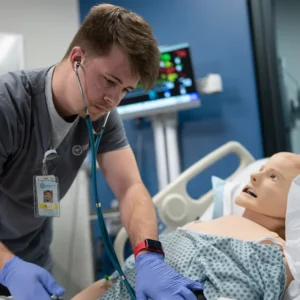 If you’ve recently earned a medical assisting degree and are looking for a job, or are considering entering a dental assisting program and are wondering what kinds of professional opportunities may await you upon graduation, there are several non-traditional options you may want to consider. One area that is in desperate need of dedicated, well-trained health care professionals on at least a part-time basis is the prison system. Across the country, prisons are coming under fire for the level of health care they are providing to inmates, and that criticism could lead to major institutional change. At the same time, states have been spending an increasing percentage of their budgets attempting to treat inmates.1 Arizona prisons draw criticism The Arizona chapter of the American Friends Service Committee, a Quaker group committed to prison reform, recently held a news conference where Caroline Isaacs, the group’s program director, was highly critical of the way the state cared for its inmates.2 Among the claims made by Isaacs was that the state delays or denies medical care to prisoners, fails to provide adequate medication and medical devices to its prison complexes, and overlooks staffing levels that are far too low to handle the total inmate population. To emphasize her points, she cited an estimate by her group that there have been 50 inmate deaths in Arizona this year, a number she called far too high. AFSC-Arizona also released a 33-page report that included several case studies involving inmates who have received poor medical care. Public pressure, like the kind exerted by Isaacs’ group, has already made a difference in Arizona. Earlier in 2013, in response to widespread accusations that its previous medical services provider was wasting state resources, the state’s Department of Corrections terminated the contract, replacing the provider with another company. The new provider claims that it will be hiring more staff as part of a system-wide upgrade. Other states experiencing similar problems Arizona is far from the only state in the U.S. that is having difficulties with prisoner health care. A new report from the Pew Charitable Trusts showed that 42 states increased spending on medical services for inmates between 2001 and 2008. And the median growth for prison medical costs in those states was 52 percent. The major reason for that rise was larger and aging prison populations, both of which are trends that don’t appear to be plateauing. That means prisons across the country will be in need of qualified health care professionals to help staff prison hospitals and care for inmates. 1 State Health Care Spending Project, “Managing Prison Health Care Spending,” Pew Charitable Trusts, Oct. 2013. http://www.pewstates.org/uploadedFiles/PCS_Assets/2013/SHCS_Pew-Managing_Prison_Health_Care_Spending_Report.pdf 2 “Reform Group Slams Arizona For Inadequate Prison Health Care,” Associated Press, Nov. 12, 2013. http://www.myfoxphoenix.com/story/23902319/reform-group-slams-arizona-for-inadequate-prison-health-care
If you’ve recently earned a medical assisting degree and are looking for a job, or are considering entering a dental assisting program and are wondering what kinds of professional opportunities may await you upon graduation, there are several non-traditional options you may want to consider. One area that is in desperate need of dedicated, well-trained health care professionals on at least a part-time basis is the prison system. Across the country, prisons are coming under fire for the level of health care they are providing to inmates, and that criticism could lead to major institutional change. At the same time, states have been spending an increasing percentage of their budgets attempting to treat inmates.1 Arizona prisons draw criticism The Arizona chapter of the American Friends Service Committee, a Quaker group committed to prison reform, recently held a news conference where Caroline Isaacs, the group’s program director, was highly critical of the way the state cared for its inmates.2 Among the claims made by Isaacs was that the state delays or denies medical care to prisoners, fails to provide adequate medication and medical devices to its prison complexes, and overlooks staffing levels that are far too low to handle the total inmate population. To emphasize her points, she cited an estimate by her group that there have been 50 inmate deaths in Arizona this year, a number she called far too high. AFSC-Arizona also released a 33-page report that included several case studies involving inmates who have received poor medical care. Public pressure, like the kind exerted by Isaacs’ group, has already made a difference in Arizona. Earlier in 2013, in response to widespread accusations that its previous medical services provider was wasting state resources, the state’s Department of Corrections terminated the contract, replacing the provider with another company. The new provider claims that it will be hiring more staff as part of a system-wide upgrade. Other states experiencing similar problems Arizona is far from the only state in the U.S. that is having difficulties with prisoner health care. A new report from the Pew Charitable Trusts showed that 42 states increased spending on medical services for inmates between 2001 and 2008. And the median growth for prison medical costs in those states was 52 percent. The major reason for that rise was larger and aging prison populations, both of which are trends that don’t appear to be plateauing. That means prisons across the country will be in need of qualified health care professionals to help staff prison hospitals and care for inmates. 1 State Health Care Spending Project, “Managing Prison Health Care Spending,” Pew Charitable Trusts, Oct. 2013. http://www.pewstates.org/uploadedFiles/PCS_Assets/2013/SHCS_Pew-Managing_Prison_Health_Care_Spending_Report.pdf 2 “Reform Group Slams Arizona For Inadequate Prison Health Care,” Associated Press, Nov. 12, 2013. http://www.myfoxphoenix.com/story/23902319/reform-group-slams-arizona-for-inadequate-prison-health-care



